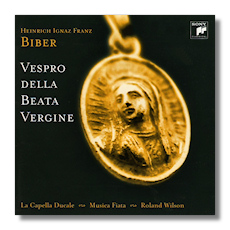
The Internet's Premier Classical Music Source
Related Links
- Biber Reviews
- Latest Reviews
- More Reviews
-
By Composer
-
Collections
DVD & Blu-ray
Books
Concert Reviews
Articles/Interviews
Software
Audio
Search Amazon
Recommended Links
Site News
 CD Review
CD Review
Heinrich Ignaz Biber

Vespro della Beata Vergine
Monika Mauch, soprano
Wolf Matthias Friedrich, bass
Anette Sichelschmidt, violin
La Capella Ducale
Musica Fiata/Roland Wilson
Sony Classical 82876-70932-2
Biber is still one of those handful of Baroque composers whose reputation deserves to be higher than it typically is. But that's changing. To listen to almost any piece by Biber (and by Schmelzer, Zelenka, Scheidt and Schein, for example) is to be struck by most distinctive and positively idiosyncratic uses of melody, texture, tonality and instrumentation which can hold their own with the traditionally ranked 'major' figures of the seventeenth and eighteenth centuries.
Thanks to the book by Eric Chafe, The Church Music of Heinrich Biber, though, there is now greater interest in Biber's music other than for strings. Biber worked at Salzburg Cathedral for the last 30 years of his life. That building gave great scope for polychoral music where up to five choirs and groups of instrumentalists – not to mention five organs – were distributed in galleries and acoustically striking spots throughout the resonant atmosphere. By the last quarter of the seventeenth century this tradition had already all but disappeared from Italy; but it was still current and popular north of the Alps.
Vespers has always been one of the most important rites of the day's worship and consists of multiple psalm settings and hymns; in this case by Biber a dozen or so. The longest and most substantial are the Dixit Dominus, which opens the performance, and Magnificat which comes towards the end. These were composed in the early 1670s and thus date from the first years of Biber's time in Salzburg. One of the more startling aspects of the music is the fact that almost every possible combination of voice and instrument and acoustical disposition across the space at Biber's disposal is exploited in these sections. But this is not distracting or gratuitous; rather, it makes an appropriate and convincing impact on the listener because such writing appeals to and directly underlines the dramatic nuances and force of the texts.
Despite the existence of Biber autographs, almost inevitably these two substantial settings have been supplemented with contemporary antiphons, psalms and hymns – by Biber. Again, these have been chosen for consistency and authenticity: the bass and the violin (Biber's instrument, of course) figure prominently. Wolf Matthias Friedrich and Anette Sichelschmidt shine in these two roles: neither overbearing, nor underplaying the contributions to a resultant rich sound world.
Indeed, there is much music of virtuosity in these Vespers. Biber's timbres are particularly magical and memorable for this. There's a crystalline, almost metallic clarity in his harmonies. And again, its achievement is not spectacular or forced. But thought-provoking and even gentle at times. Particularly in the hands of the choir, La Capella Ducale, and the instrumentalists of Musica Fiata. Their playing under Roland Wilson is inspiring, open and pleasingly undemonstrative. That does not imply plainness or lack of expression. Rather, that they have totally absorbed the spirit of the compositions and are at pains to let them speak for themselves. Admirable.
The balance between solo vocalists, chorus, solo and ripieno instruments is always going to be something that needs to be carefully arranged. Here it has been. The words of the text are generally as clear as can be; the pace as the music unfolds sensitively and the articulation of the Latin is easy on the ear, although there is some small, perhaps inevitable, sibilance at the start of the Dixit Dominus, tr.1.
As one listens to the music's progression over several occasions, one is struck by the quiet confidence with which Wilson's forces approach the close link between words and music. Although the many violin and viola virtuoso passages stand out for their beauty, and although the impact made by the brass is considerable, these are never intrusive. For Biber they are all and always in the service of the devotional purposes of the music. The businesslike weaving of ideas and celebratory flourishes in the Lauda Jerusalem, tr.9, are typical of this very co-ordinated approach. The Sonata a 6,tr.10, similarly, is played with precision and discipline despite some highly charged chordal writing.
A work made up of this number of perhaps disparately-sourced movements could run the risk of sounding disjointed. In this case, that risk has been avoided. Again it's that detachment in the musicians' approach which sees to it that Biber's underlying objective in providing striking yet appropriately restrained music for his congregations in what was a relatively provincial and inward looking community a hundred years before Mozart is what emerges to impress one most. This is achieved also by attention to detail… listen to the careful negotiation of the words of the Salve Regina a 2, tr.12. The performers achieve pathos with exactitude in equally pleasing proportions.
Meantone a' = 466 is used, although there is no indication of the instruments in the recording, which was made in the Stadtkirche of St. John and St. Martin, Schwabach in southern Germany. The acoustic is surprisingly dry and the balance at times – in the Nisi Dominus, tr.7, for example – favors the instruments over the voices. These minor quibbles should not detract from a performance which is excellent in every other way. At nearly 78 minutes this is a generous CD with a nicely-produced booklet containing the full texts in Latin, English and German. Both as an extension of a Biber collection to include that composer's splendid vocal writing and as a compelling collection of Baroque sacred music in its own right, this CD is thoroughly recommended.
Copyright © 2008, Mark Sealey



















